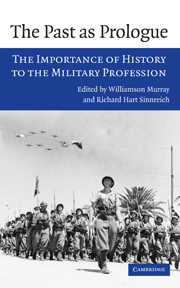Book contents
- Frontmatter
- Contents
- Contributors
- 1 Introduction
- 2 Military history and the history of war
- Part I The influence of history on the military profession
- Part II The past as illuminator of the future
- 7 Thucydides as educator
- 8 Clausewitz, history, and the future strategic world
- 9 History and the nature of strategy
- 10 Military transformation in long periods of peace: the Victorian Royal Navy
- 11 Military history and the pathology of lessons learned: the Russo-Japanese War, a case study
- 12 Obstacles to innovation and readiness: the British Army's experience, 1918–1939
- 13 What history suggests about terrorism and its future
- 14 History and future of civil–military relations: bridging the gaps
- Index
11 - Military history and the pathology of lessons learned: the Russo-Japanese War, a case study
Published online by Cambridge University Press: 05 June 2012
- Frontmatter
- Contents
- Contributors
- 1 Introduction
- 2 Military history and the history of war
- Part I The influence of history on the military profession
- Part II The past as illuminator of the future
- 7 Thucydides as educator
- 8 Clausewitz, history, and the future strategic world
- 9 History and the nature of strategy
- 10 Military transformation in long periods of peace: the Victorian Royal Navy
- 11 Military history and the pathology of lessons learned: the Russo-Japanese War, a case study
- 12 Obstacles to innovation and readiness: the British Army's experience, 1918–1939
- 13 What history suggests about terrorism and its future
- 14 History and future of civil–military relations: bridging the gaps
- Index
Summary
On the day of battle naked truths may be picked up for the asking: by the following morning they have already begun to get into their uniforms.
Sir Ian Hamilton (1908)The Russo-Japanese War of 1904 was short but intense, leaving the world shocked and enthralled by its drama. A large number of foreign military observers and journalists witnessed its conduct. Their findings were widely publicized in popular books and official studies. Pundits immediately acknowledged that the war offered important insights into the nature of future conflict at a time of seemingly revolutionary technological change and social upheaval, as well as a novel strategic geography. The validation of the lessons learned or forgotten in this Asian-Pacific “experiment” came in the great conflict of 1914–18.
It is hard to identify any lesson of the war that was not appreciated or documented at the time. Inevitably, many of these lessons were contradictory, peculiar to the theatre, and more or less appropriate to different military cultures. Moreover, observers viewed those lessons through the distorting lenses of political intrigue, social attitude, military orthodoxy, and wishful thinking. The result was that what historians at the beginning of the twenty-first century now see as having been clear auguries of the future of warfare (1914–18) generally went unheeded. The military organizations of the time often ignored the lessons identified and, equally, those they did draw of the future often proved lethally wide of the mark.
- Type
- Chapter
- Information
- The Past as PrologueThe Importance of History to the Military Profession, pp. 170 - 194Publisher: Cambridge University PressPrint publication year: 2006

